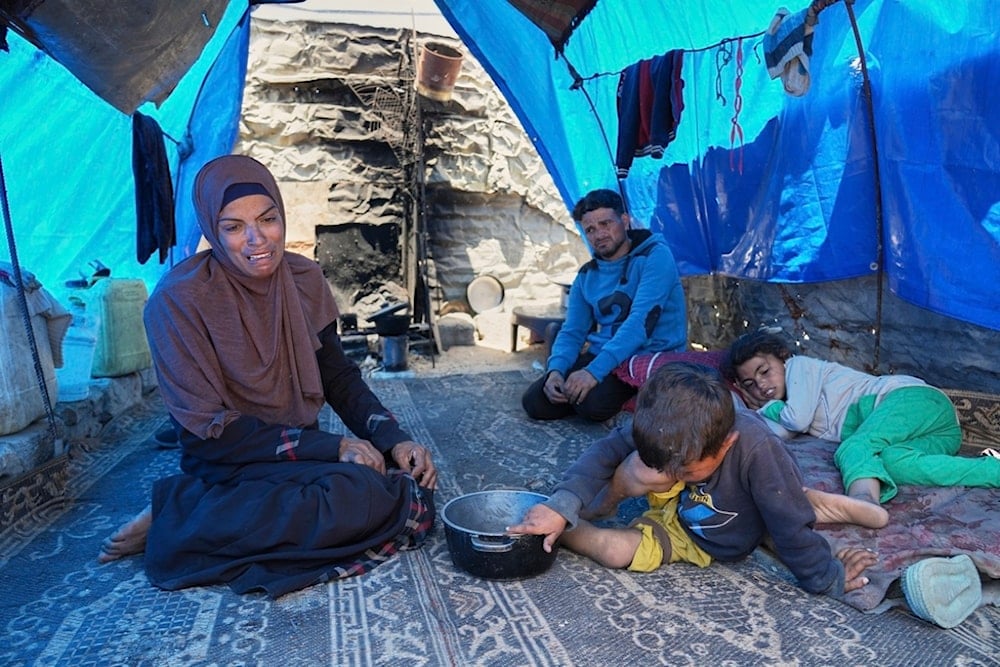Lifting Gaza blockade urgent, delays in aid have consequences: UN
UN human rights experts declared Thursday that the world faces a binary choice: either act to stop the massacres or witness the Palestinian people being exterminated in full view.
-

Ward Nar, left, reacts as she speaks with the photographer after returning empty-handed from attempting to receive donated food for her family, including her husband Mohammed Zaharna (center right) and their children, Sally (right) and Raed, at a community kitchen in Khan Younis, in the southern Gaza Strip, Friday, May 9, 2025 (AP Photo/Abdel Kareem Hana)
The United Nations has issued its strongest warning yet regarding the catastrophic humanitarian crisis in Gaza, calling the lifting of the Israeli blockade an urgent necessity. UN spokesperson Stéphane Dujarric stated Friday that "aid must reach everyone, wherever they are, based on their needs," adding that the situation on the ground has become untenable after nearly 10 weeks of severe aid restrictions.
"The UN Office for the Coordination of Humanitarian Affairs says lifting the Gaza blockade is more urgent than ever," Dujarric said. "The humanitarian crisis has worsened significantly after nearly 10 weeks of aid being cut off."
He further warned that "any additional delay in the entry of aid into Gaza will have consequences that cannot be reversed." Dujarric reiterated UN Secretary-General António Guterres's stance that "the organization will not participate in any arrangement that does not respect humanitarian principles."
Aid Sabotage
The blockade has decimated critical aid pipelines. According to the World Food Programme, food stocks have run out, and community kitchens have ceased operating due to the lack of supplies. UNRWA reports confirm that residents are surviving on little more than animal feed and contaminated water in many areas.
Meanwhile, the US has proposed a controversial aid delivery plan involving the establishment of "secure distribution sites" in southern Gaza—operated by private contractors and coordinated with "Israel." Humanitarian agencies and the UN have rejected the plan, warning that it violates international humanitarian norms and would force starving civilians to risk their lives reaching isolated drop-off points rather than receiving aid through established, neutral mechanisms.
The United Arab Emirates has also expressed opposition, stating it will not participate in the US-backed mechanism in its current form, underscoring deep international concern over the politicization of humanitarian relief.
Read more: US, 'Israel' discuss potential US-led administration in Gaza: Reuters
Starvation Warfare
In Gaza, the situation remains catastrophic. As of late April, the Gaza Government Media Office reported that over 65,000 children had been hospitalized due to severe malnutrition, attributing the crisis to the ongoing Israeli blockade. The UN World Food Programme confirmed in early April that its last operating bakeries had shut down due to a lack of flour and cooking oil. Since March 2, Israeli authorities have maintained a total blockade on Gaza's crossings, which has prevented the entry of thousands of trucks carrying urgently needed food, fuel, and medical supplies. The blockade, now over two months old, continues to accelerate the humanitarian collapse.
Adding to the alarm, UN human rights experts declared Thursday that the "escalating atrocities" in Gaza have placed the international community at a moral crossroads. They warned that the world faces a binary choice: either act to stop the massacres or witness the Palestinian people being exterminated in full view.
Read more: Stop the genocide or witness end of life in Gaza: UN experts warn
As "Israel's" genocidal assault on Gaza continues unabated since its resumption on March 18, 2025, the death toll mounts and hope for survival diminishes. Thousands have been killed, wounded, or are missing, while the siege continues to condemn over two million people to slow, preventable deaths.

 3 Min Read
3 Min Read








